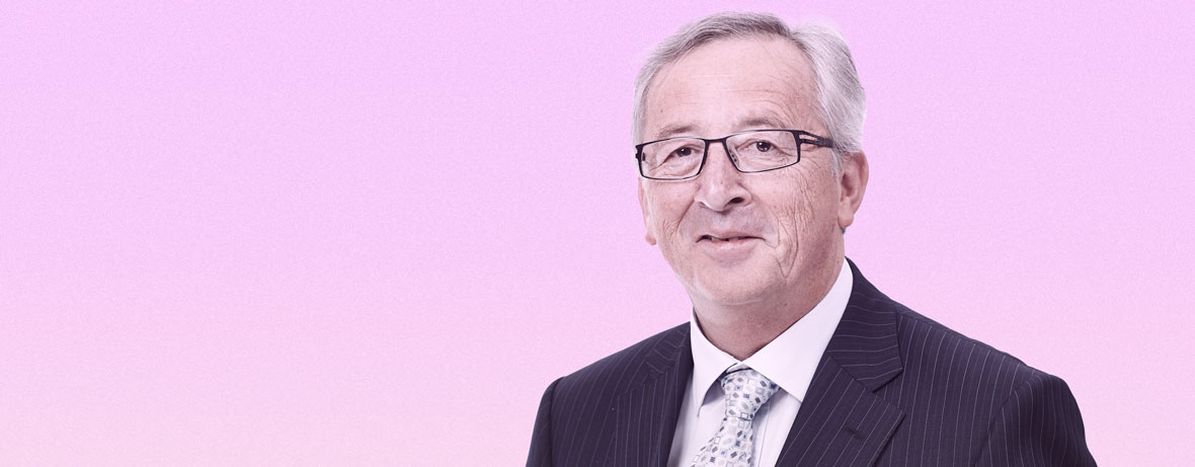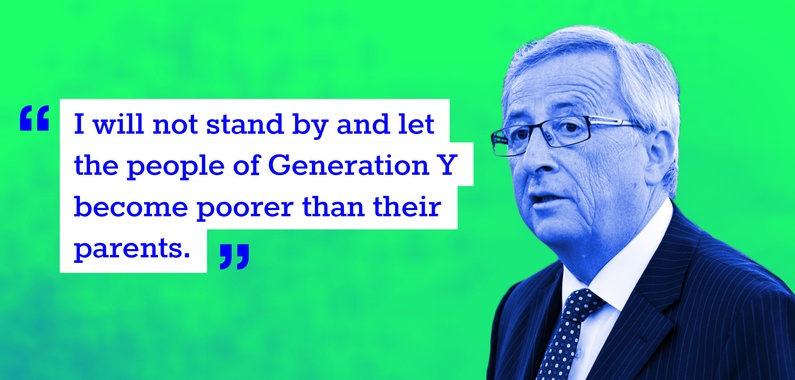
Jean-Claude Juncker: "Europe is a team effort"
Published on
Translation by:
Phil W. BaylesThe president of the European Commission seemed tired and pessimistic during his address on the state of the European Union last September. Between Brexit, the migrant crisis and the rise of European populism, who can blame him? But in an interview with cafébabel, Jean-Claude Juncker proves he's not out for the count just yet.
cafébabel: You've said you won't run for office again and your address on the future of Europe seemed very pessimistic. After two years at the head of the European Commission is the strain of the job getting to you?
Jean-Claude Juncker: Not in the slightest. It's true, I'm disappointed when I see the strains of solidarity between member states, especially over a sensitive topic like the refugee crisis. But it doesn't make me pessimistic; it makes me combative.
cafébabel: Why?
Jean-Claude Juncker: Because I'm convinced that Europe has to redouble its efforts. We're the smallest continent on Earth, and by 2060 we'll only account for 5% of the global population, as opposed to 25% at the start of the 20th century. That's why each of the five scenarios in the White Paper on the future of Europe relies on us working together, as a Union.
cafébabel: Sounds like a tough job.
Jean-Claude Juncker: Yes, but it's essential. If it's hard, then that's only because it's worth doing!
cafébabel: How would you explain the role of the European Commission to a 10-year-old?
Jean-Claude Juncker: One year, when I was a child, my two grandmothers both bought me electric trains for Christmas. One was made in France, the other in Germany. I could never get them to work together. The European Commission is the institution that allows us to do that. And not just for trains but in lots of different areas. We try and start initiatives that are in the interests of all of our citizens and businesses, which improve our daily lives, and which bring us closer together. But the Commission doesn't have unlimited power. We'll never connect all the trains, across all of Europe, if our ideas aren't accepted, and if our decisions aren't put into effect at ground level. Europe is a team effort.
 cafébabel: Your reaction to the Dutch elections was simply: "It's good." Do you feel relieved by it?
cafébabel: Your reaction to the Dutch elections was simply: "It's good." Do you feel relieved by it?
Jean-Claude Juncker: The result of the elections in Holland is a positive sign for the upcoming elections in France and Germany. They had a high turnout, as did the Austrian presidential elections which took place last December. And it's encouraging because it shows that there is a strong will among the electorate to prevent extremists and Europhobes from taking office. It's important that people get out there, defend their convictions all the way to the ballot box. Watching sports at home is fine, but it's even better to get out onto the field and defend your team colours. Contented Europeans who stay at home will always lose against populists who run.
cafébabel: Since the Brexit vote we've seen a number of factors that explain the rise of extreme parties: a social divide between urban and rural communities, rising levels of fear and unemployment... What can do the Commission do to solve these problems?
Jean-Claude Juncker: One of the lessons we learnt from Brexit is that we can't spend years listening to people complain that the European Union is a bad thing, that it doesn't work, it's too expensive and its rules draconian, and then be surprised that voters reject it. The Commission, with the resources it has, is trying to provide concrete answers to the worries of our citizens.
cafébabel: Such as?
Jean-Claude Juncker: We've launched a lot of new initiatives. Our new investment plan - known as the Juncker Plan - will allow us to invest more money in creating jobs and growth. We've made social justice a priority in our political agenda, just as it has been throughout my political career. But we can't pretend that Europe can tackle unemployment and inequality and insecurity alone. We simply can't. Individual member states have more resources than we do.
cafébabel: What can you do on a day-to-day level to distance yourself from the image of an "unfeeling monster" that most people have of the European Commission?
Jean-Claude Juncker: I can't stand unfeeling monsters as much as I can't stand elites, even if I read every day that I'm both. I've always felt that you can't get into politics if you don't like people, if you don't know how to listen to them. That's why I ask my Commissioners not to stay cooped up in the Berlaymont [the Commission's headquarters] but to see the rest of Europe, to meet national governments and partners and start dialogues with citizens. "Big on big things and small on small things" isn't just a slogan, it's vital if we want to be more effective and bridge the divide between the EU and its detractors.
cafébabel: Europe's institutions have seen their fair share of scandals. Do you accept that they do little to help an already unpopular Commission? How popular do you feel Europe's institutions are right now?
Jean-Claude Juncker: Scandals help nobody, and we can't under-state the impact they have on public opinion. I understand the discontent that these affairs bring out, and I try and give each one the attention it deserves. We've reworked the Commissioners' code of conduct to ensure that all presidents of the Commission take a "cooling off period" of at least three years after finishing their term before they rejoin the private sector, as opposed to the current 18-month period, and Commissioners now need to take two years. As for the popularity of Europe's institutions, I refer you to the last Eurobarometer, which shows that people have more confidence in the European Union than they do in some national governments.
cafébabel: One in four young Europeans is currently unemployed. Can they count on the EU for support?
Jean-Claude Juncker: Youth unemployment is a travesty. I will not stand by as the Millennial generation - Generation Y - becomes the first generation to be poorer than their parents in 70 years. I wonder how a continent as rich as Europe could have forgotten what should be a universal principle: that today's young people, and tomorrow's, have the right to a job. This is first and foremost the responsibility of national governments, but we will give them our full support. Most notably we've launched the Youth Guarantee, which has helped more than 9 million young people find a job, a work placement or an apprenticeship. There's also the impact of the Erasmus program; one Erasmus student in three goes on a work placement for their time abroad. And the fight for youth employment will remain a priority until the final day of my Commission's mandate.
cafébabel: How do you explain the large number of first-time voters in the EU that are supporting extreme-right parties?
Jean-Claude Juncker: First-time voters in 2017 were between 9 and 11 years old in 2008. They grew up in the worst financial crisis since the end of the Second World War. They were its first victims. It's easy to understand the despair and sense of fatigue they must have felt waiting for things to change. They have the right to see things improve. We have to prove to them that Europe can improve their lives, that it can give them the means to flourish, and to turn their backs on despair. It's the best response against the temptations of extremism.
cafébabel: Do you really see young people changing their minds on Europe?
Jean-Claude Juncker: I already see young people deeply invested in European solidarity! Thousands have mobilised in massive numbers for the European Solidarity Corps, which I created to help aid get to where it was needed most and allow young people the chance to develope their vocational skills to find employment. I've also been impressed by the spontaneous birth of Pulse of Europe, which has seen thousands of citizens, including young people, gather in cities every week. They're very worried by populist attacks against Europe. As one said to me: "We don't want to ignore the flaws and mistakes of the European Union, but we have to do something constructive."
cafébabel: This year we celebrate 60 years since the signing of the Treaty of Rome, a fundamental text that only a small, educated portion of young Europeans are even aware of. That's a problem, isn't it?
Jean-Claude Juncker: I agree that Europe needs to explain itself more clearly, and we need to be able to interrogate it about what it does. I don't just say this, I've done something about it. Recently I've taken part in dialogues with citizens in Belgium, in Slovenia and in Malta. But other people need to do their share too: like academics, and journalists. I hope that the 60th anniversary of the Rome Treary has been a chance for more young people to learn about these texts, but also about our history; the history of my parents' generation, a history of war, misery, torture. We need to explain to them that their future lies with Europe.
cafébabel: What kind of Europe will our grandchildren live in, 60 years from now?
Jean-Claude Juncker: I'd like our grandchildren to continue to reap al of the benefits that we have enjoyed for decades. I want them to see 70 more years of uninterrupted peace, and to live better lives than we have lived. But the shape of Europe in 60 years isn't up to me. The Europe we leave to our grandchildren will be the result of the choices we make in the months to come. That's the question at the heart of the White Paper: what future do we want for ourselves, and our children, and Europe? Our future is in our hands; it's up to us to decide it, and shape it. Either we can let ourselves be swept away by globalisation, by new technologies and the impact they will have on our lives and our jobs; or we can embrace them, master them, and reap the new benefits they will offer us. That's how Europe has always been made: by men and women who have chosen to shape the course of history rather than being imprisoned by it.
---
This interview was conducted via email.
Translated from Jean-Claude Juncker : « On ne fait pas l’Europe dans son fauteuil »



